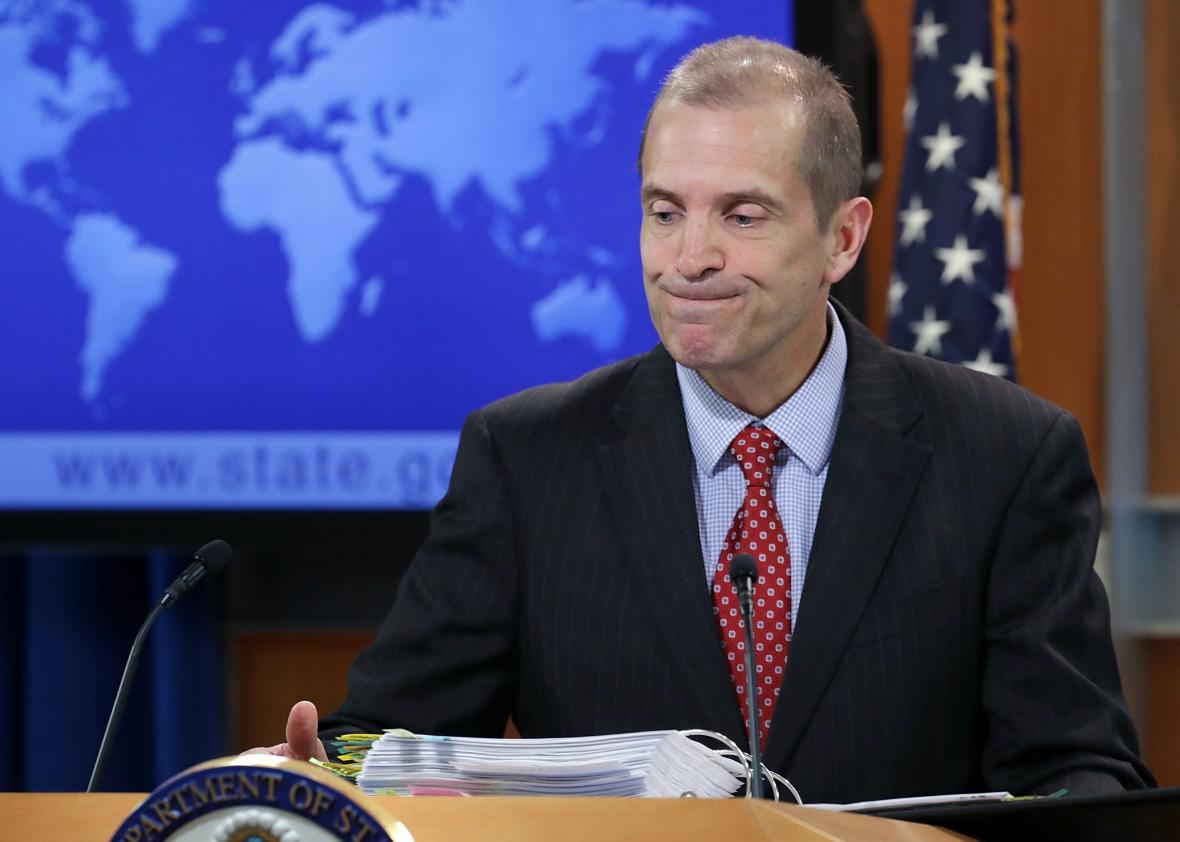The State Department finally held its first press briefing of the Trump era Tuesday. Much of it was devoted to the president’s revised executive order banning travel from six Muslim-majority countries, with acting spokesman Mark Toner struggling to explain why these particular countries are targeted by the ban.
Toner was asked about the 300 people who, according to the text of the order, entered the U.S. as refugees and are currently subjects of FBI terrorism investigations. Were they from the countries in question? Not necessarily. “My understanding is that these are 300 individuals globally speaking, not from the six countries targeted in this EO,” Toner said.
The original ban, issued in January, targeted Iran, Iraq, Libya, Somalia, Sudan, Syria, and Yemen. The new version drops Iraq from the list, reportedly following pressure from the Pentagon and State department, given Iraq’s key role in fighting ISIS, as well as—reportedly—a significant campaign from the Iraqi government’s lobbyists in Washington. The new order notes that Iraq is a “special case” because of the “close cooperative relationship between the United States and the democratically elected Iraqi government” and also credits the Iraqi government with having undertaken steps to enhance scrutiny of travelers since the original order. Toner was asked Tuesday if Iraq was removed from the list “only because of the vetting process or if it is because the partnership in the fight against ISIS would be jeopardized?”
“Both,” he replied. “Obviously we would not have lifted them off this list if we were not convinced and satisfied that they were taking steps to address our concerns.” This isn’t particularly convincing: If the relationship between Baghdad and Washington is so close and productive, and Iraq is so willing to cooperate with U.S. vetting efforts, why couldn’t the U.S. have simply asked them to upgrade their procedures rather than putting them on the list to begin with, threatening a key military alliance in the process.
Toner was also asked about countries like Syria and Libya, which don’t have functioning governments in control of much of their territory. (Somalia and Yemen could go in that category too.) Given that there’s virtually no chance of these countries demonstrating the kind of vetting procedures the U.S. is asking for in order for the ban to be eventually lifted, Toner was asked if this effectively amounts to a permanent ban on their citizens?
“I don’t want to condemn any country to a perpetual travel ban,” he said. “That’s not what this is about. To the extent that we can work with the government, we’re going to do so.”
Then there’s Iran, the country that—due to the large Iranian American population with relatives back home and the large number of the country’s citizens working and studying in the U.S.—will be the largest group affected by the order.
Toner maintained that the order is directed at the Iranian regime for its “continued bad behavior in the region” and its designation as a state sponsor of terrorism. “This has nothing to do with those Iranians who may want to come and visit the United States to develop an understanding of the United States or visit relatives here,” he said, though that is precisely the group that will be affected.
A reporter pointed out that when Iran sponsors foreign terrorism, it usually does so through the citizens of other countries, such as the Lebanese group Hezbollah. So why isn’t Lebanon on the list? Toner didn’t have an answer, saying simply that, Iran had shown a “consistent ability to create chaos and sow chaos in the region and fund terrorist activities and its because of that they’re in this category.”
This is contradictory, though. Will the Iranians continue to be on the list as long as their government is a “bad actor” or until they cooperate with U.S. vetting procedures? These are two different things.
“We don’t believe we can ensure the safety of the American people given the current vetting procedures we have with people form Iran,” Toner replied.
Would the U.S. be reaching out to Iran for cooperation on vetting?
“I can’t speak to that.”
To be fair, Toner, a career foreign service officer who served as deputy spokesman under Barack Obama, was in the difficult position of trying to make an arbitrary policy sound deliberate. The reasons why these countries were selected is pretty obvious: Iran, Syria, and Sudan, are on the State Department’s State Sponsors of Terrorism list—an outdated and highly politicized category that still included Cuba until 2015. Legislation passed in 2015 following the San Bernardino, California, attack put restrictions on visa-free travel from citizens of those three countries plus Iraq. (Never mind that neither of the San Bernardino attackers came from any of those countries.) The Department of Homeland Security extended the visa waiver restrictions to Libya, Somalia, and Yemen in 2016.
Unable to simply ban all Muslim travelers, as Trump said he would do during the campaign, the administration instead just drew up a list of countries based on existing restrictions. As an added bonus, these countries—unlike, say, Jordan, Saudi Arabia, or Pakistan—don’t have much leverage or influence in Washington. Iraq does have some leverage, thanks to the fight against ISIS, so it got itself taken off.
Trying to find a logical explanation for why barring citizens from these particular six countries will keep America safe won’t accomplish much, beyond forcing spokespeople like Toner into some pretty uncomfortable contortions.
